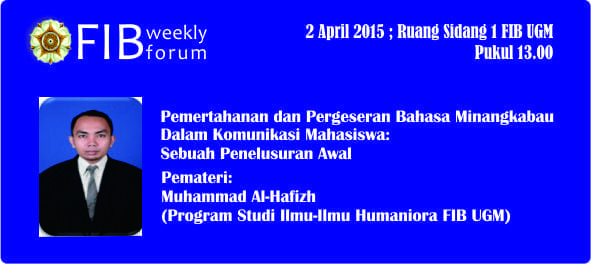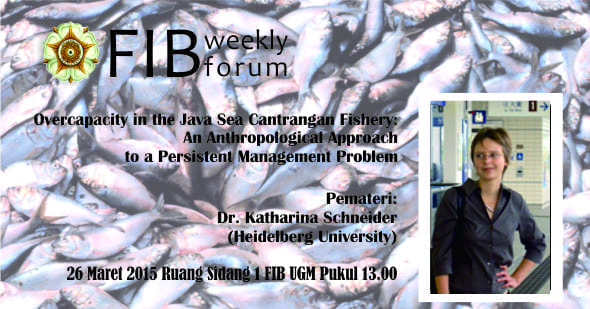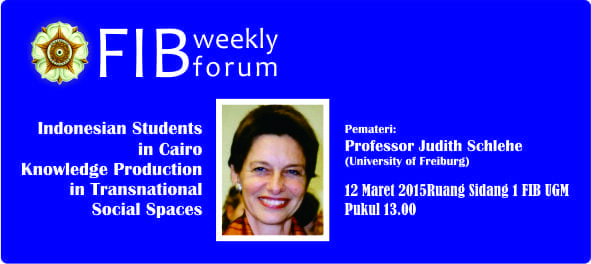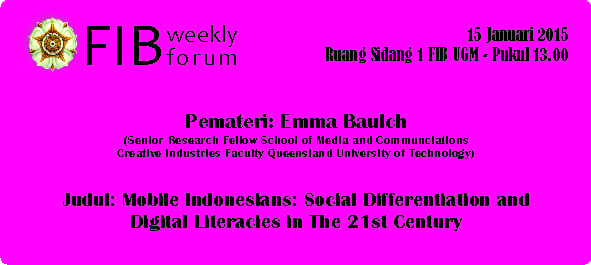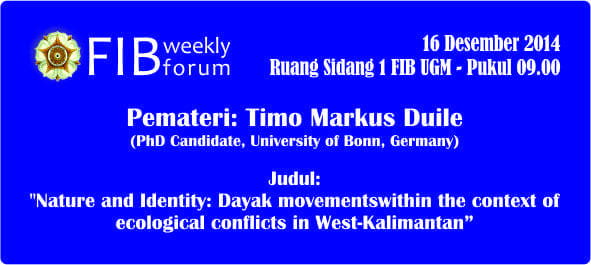Pemertahanan dan Pergeseran Bahasa Minangkabau
Dalam Komunikasi Mahasiswa : Sebuah Penelusuran Awal
Oleh: Muhammad Al-Hafizh
Program Studi Ilmu-Ilmu Humaniora FIB UGM
2 April 2015 ; Ruang Sidang 1 FIB UGM
Pukul 13.00
Indonesia adalah salah satu negara di dunia yang memiliki banyak ragam bahasa daerah. Jumlah bahasa daerah di Indonesia yang sudah didata oleh Badan Pengembangan dan Pembinaan Bahasa kurang lebih 743 bahasa. Sebagian bahasa daerah tersebut adalah bahasa daerah yang tetap eksis dan masih bertahan hingga saat ini karena didukung oleh jumlah penutur yang besar. Namun, ada pula bahasa daerah yang terancam punah karena jumlah penuturnya sedikit dan hanya digunakan oleh kalangan generasi tua. Bahasa Minangkabau adalah salah satu bahasa daerah dari rumpun bahasa Melayu yang memiliki penutur lebih dari 5.530.000 jiwa yang menggunakan bahasa Minangkabau sebagai bahasa ibu khususnya di provinsi Sumatera Barat (kecuali di kepulauan Mentawai). Seiring dengan perkembangan zaman dan arus globalisasi, pemertahanan dan pelestarian bahasa Minangkabau dirasakan semakin penting untuk digalakkan, khusunya di kalangan mahasiswa. Tulisan ini merupakan hasil penelusuran awal mengenai pemertahanan dan pergeseran bahasa Minangkabau dalam komunikasi mahasiswa yang dilakukan di Fakultas Bahasa dan Seni UNP Padang. Tujuannya adalah untuk mengetahui bagimana bentuk pemertahanan dan pergeseran bahasa Minangkabau di kalangan mahasiswa. Pengumpulan data dilakukan melalui kuesioner dan pengamatan langsung. Responden penelitian ini adalah mahasiswa FBS UNP yang dipilih berdasarkan kriteria sebagai penutur asli bahasa Minangkabau. Metode yang digunakan dalam penelitian ini adalah metode deskriptif, dan data dianalisis secara kuantitatif. Kesimpulan dari penelitian ini adalah ditemukannya lemahnya pemertahanan dan pelestarian bahasa Minangkabau di kalangan mahasiswa. Oleh karena itu diusulkan seperangkat strategi untuk pelestarian bahasa Minangkabau yang meliputi; gerakan satu hari berbahasa Minangkabau di kampus, penulisan karya sastra berbahasa Minangkabau, dan komunikasi jejaring sosial berbahasa Minangkabau.
Key word: bahasa Minangkabau, pemertahanan bahasa, pergerseran bahasa

